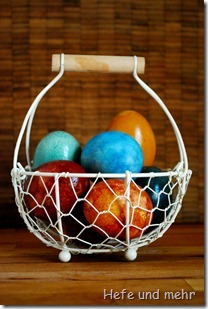 I love to test different natural dyes for Easter eggs. And so I try each year different dyes which I extract from plants and spices.
I love to test different natural dyes for Easter eggs. And so I try each year different dyes which I extract from plants and spices.
This year I decided to use tumeric, red cabbage and red beets. I started to collect peels from red beets when cooking already some weeks ago and keep them in the freezer until now. With the red cabbage I use the fact that the anthocyanin which gave the colour to the leaves is pH sensitive and change colour depending on the pH. A high pH gave a green-blue colour, while a low pH change the colour to red.
I used the red cabbage dye at a neutral pH for staining dark blue-green eggs, while increasing the pH with soda leads to light green eggs. The most suprising fact is that the red solution which had a low pH because of the vinegar resulted in bright blue egg. I never expected such a bright colour because I used brown eggs.
How to dye
Cover hard boiled eggs with the dye you choose (see below). Let the eggs sit in the dye overnight. The next morning pat them dry with some paper towel, then put a little bit oil on them and polish with a paper towel to make them shine.
Each of the dyes I use are enough to dye 3 eggs. I use brown eggs but white eggs will yield more brilliant colours.
Dark blue-green Eggs
you will need a part of this solution for the green and blue Eggs, too
- 750g red cabbage
- 750g water
Cut the red cabbage in small pieces, add them to the water and bring to boil. Simmer for 30 min, then puree them with the food processor and strain to a sieve.
Divede the solution on three glases (see below).
Green Eggs
- 250g red cabbage solution (s. above)
- 10g Soda
Dissolve Soda in red cabbage solution.
Blue Eggs
- 250g red cabbage solution (s. above)
- 10g vinegar essence
Mix vinegar essence with red cabbage solution.
Red Eggs
- 200g red beets (peels)
- 500g Wasser
Cut the beet in small pieces, add them to the water and bring to boil. Simmer for 30 min, then puree them with the food processor and strain to a sieve.
Yellow Eggs
- 10g Tumeric
- 500g water
Add boiling water to the tumeric.
Deutsch



Pingback: Hefe und mehr » Blog Archive » Ideen für das Osterfrühstück
Pingback: Hefe und mehr » Blog Archive » Ideen für den Ostertisch